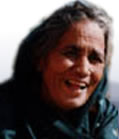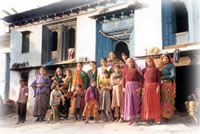 |
 |
||
 |
|||
|
RELATED THEMES community activities development gender OTHER LOCAL THEMES BACKGROUND |
social institutions
India 1 explains they protested against more than this: "Not just Chipko, but wherever there was a protest movement, for instance against a mining project in our area or [when] people used to exploit young girls for money, or they didn't want to educate girls. Our Mahila Mangal Dal used to work for these causes. when we were in the Chipko movement we first went into the jungles and clung to the trees where the contractors were tapping for resin. We did a lot of this kind of thing." Mahila Samakhya, a government-sponsored programme for women's empowerment, is also mentioned, though with some reservations: "Its main aim is to provide equal rights to women and also give them equal education," says India 13. "In some villages people understand the value of this organisation but in others it's a tough job to make them understand. In places where there is lot of politics and a lot of drinking habits, we find it tough to bring home to them its aim." Sometimes the odds are too tough: "Many times the villagers ask us what we are going to offer to them. Some of them feel that, we, the workers of Mahila Samakhya, bother them unnecessarily.They want those types of programmes that offer them some financial assistance. At times, out of frustration, we stop working." Another woman (India 25) also mentions that her Mahila Mangal Dal's effectiveness is hampered by lack of funds. Another key organisation mentioned in many interviews is the panchayat, although its role seems to have changed over the years. It is most often mentioned as the traditional forum in which community decisions were made and reinforced, whether this was to work together to build or repair irrigation channels, or to resolve a dispute. Several say that with the rise in power of state courts and of the police, the influence of the panchayat as a social, rather than just a political (and practical), institution has been undermined. There is a feeling expressed in some of the testimonies that such community-based decisions and sanctions exert less power today. Collective activities such as canal building are also in decline. Generally, though, despite such changes and the often criticised individualism of modern life, these narrators seem to live in communities still characterised by a sense of social responsibility and cohesion. An informal kind of social institution are the regular melas, or fairs. Several narrators point out that they provide much needed punctuation in hard working lives: a time to have fun but also to exchange news and information. quotes about social institutions"We had a thriving panchayat system in our area. In each village a panchayati square would be identified and everybody would gather there. Then people would put aside their taklis (spindles) and ringals (baskets) and be quiet and one or two panchs (men who lead the panchayat) would speak while the rest listened attentively. Say, for example, some road needed to be repaired.or a deity worshipped then a decision would be taken. Every one abided by the panchyat's decision. Now there are no panchayats, [and] if ever there is one then each person tries to put pressure to get his own way and there is no decision." "In our times there was a prahari (watchman) in the village who would cry out the important news such as meetings etc. each family in the village would give him a nali (1 kg) of grain from each crop as his due. He would cry out that today is the panchayat and everybody should come together. No sooner did people hear him that they would gather. These days nobody comes even if they hear this call, and if they do then they will fight." "A lot of us women tried to do some work through the Mahila Mangal Dal. We bore a lot of hardship. All our village people came with us. We had a big struggle with the police. We experienced beating. because we would not let the trees be cut.People came to cut the forest. But we flung our arms around the trees." |
|
 Narrators describe a number of community institutions, and it is clear that traditions of self-help and social activism remain strong among these narrators. Probably the most frequently mentioned organisation is the Mahila Mangal Dal (rural women's council). Many narrators participate in their local one and describe a range of activities from building roads and schools to starting tree nurseries. These groups have also played a decisive role in social development - from running anti-alcohol campaigns to women's literacy classes - as well as in environmental activism: some of the narrators spearheaded the Chipko movement against deforestation.
Narrators describe a number of community institutions, and it is clear that traditions of self-help and social activism remain strong among these narrators. Probably the most frequently mentioned organisation is the Mahila Mangal Dal (rural women's council). Many narrators participate in their local one and describe a range of activities from building roads and schools to starting tree nurseries. These groups have also played a decisive role in social development - from running anti-alcohol campaigns to women's literacy classes - as well as in environmental activism: some of the narrators spearheaded the Chipko movement against deforestation.